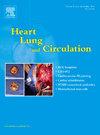The Correlation Between Triglyceride-Glucose Index and Its Associated Indices With All-Cause and Cardiovascular Mortality in Patients With Advanced-Stage Cardiovascular-Kidney-Metabolic Syndrome
IF 2.2
4区 医学
Q2 CARDIAC & CARDIOVASCULAR SYSTEMS
引用次数: 0
Abstract
Aim
The American Heart Association (AHA) introduced the Cardiovascular-Kidney-Metabolic (CKM) syndrome in 2023, emphasising low survival rates in advanced CKM patients. This study explores the predictive value of the triglyceride-glucose (TyG) index and its associated indices for all-cause and cardiovascular mortality in these patients.
Methods
Data from 5,858 patients with advanced CKM (defined as stage 3/4 CKM per AHA criteria) were extracted from the National Health and Nutrition Examination Survey (NHANES), USA. The median follow-up duration for mortality outcomes was 8.21 years. Patients were categorised into tertiles (T) based on the TyG index and its associated indices (TyG-waist-to-height ratio [TyG-WHtR] and TyG-weight-waist index [TyG-WWI]; T1, T2, T3). Cox proportional hazards regression was used to analyse the prognostic value of these indices, adjusting for various covariates, and the results were presented as hazard ratio (HR) and 95% confidence interval (CI). Restricted cubic splines (RCS) assessed linear or nonlinear relationships between these indices and advanced CKM risk, with subgroup analyses for stratified examination.
Results
A total of 5,826 and 5,150 patients were included for the analysis of all-cause mortality and cardiovascular mortality, respectively. Multivariable Cox regression demonstrated that in the T3 group, both TyG-WHtR (HR 1.33, 95% CI 1.04–1.70) and TyG-WWI (1.40, 1.01–1.95) were significantly associated with all-cause mortality. Similar associations were observed for cardiovascular mortality, with TyG-WHtR (1.47, 1.06–1.88) and TyG-WWI (1.71, 1.06–2.78) showing comparable effects. Both indices exhibited a J-shaped association with mortality, with significant increases in HRs for all-cause mortality observed at TyG-WHtR ≥5.43 and TyG-WWI ≥99.03, while cardiovascular mortality HRs showed a significant rise at TyG-WWI ≥98.87.
Conclusion
This study is the first known to link TyG-WHtR and TyG-WWI with all-cause and cardiovascular mortality in advanced CKM patients, indicating their significant predictive value for this population.
晚期心血管-肾代谢综合征患者甘油三酯-葡萄糖指数及其相关指标与全因死亡率和心血管死亡率的相关性
目的:美国心脏协会(AHA)在2023年引入了心血管-肾-代谢(CKM)综合征,强调晚期CKM患者的低生存率。本研究探讨了甘油三酯-葡萄糖(TyG)指数及其相关指标对这些患者全因死亡率和心血管死亡率的预测价值。方法:从美国国家健康与营养检查调查(NHANES)中提取5858例晚期CKM(按AHA标准定义为3/4期CKM)患者的数据。死亡率结果的中位随访时间为8.21年。根据TyG指数及其相关指标(TyG-腰高比[TyG- whtr]、TyG-体重-腰围指数[TyG- wwi]; T1、T2、T3)将患者分为几组(T)。采用Cox比例风险回归分析这些指标的预后价值,并对各协变量进行调整,结果以风险比(HR)和95%置信区间(CI)表示。限制性三次样条(RCS)评估这些指标与晚期CKM风险之间的线性或非线性关系,并进行亚组分析进行分层检查。结果:共有5826例和5150例患者分别被纳入全因死亡率和心血管死亡率分析。多变量Cox回归显示,T3组TyG-WHtR (HR 1.33, 95% CI 1.04 ~ 1.70)和TyG-WWI(1.40, 1.01 ~ 1.95)与全因死亡率显著相关。心血管死亡率也有类似的相关性,TyG-WHtR(1.47, 1.06-1.88)和TyG-WWI(1.71, 1.06-2.78)表现出类似的效果。两项指标均与死亡率呈j型相关,TyG-WHtR≥5.43和TyG-WWI≥99.03时,全因死亡率hr显著升高,而TyG-WWI≥98.87时,心血管死亡率hr显著升高。结论:本研究首次将TyG-WHtR和TyG-WWI与晚期CKM患者的全因死亡率和心血管死亡率联系起来,表明它们对这一人群具有重要的预测价值。
本文章由计算机程序翻译,如有差异,请以英文原文为准。
求助全文
约1分钟内获得全文
求助全文
来源期刊

Heart, Lung and Circulation
CARDIAC & CARDIOVASCULAR SYSTEMS-
CiteScore
4.50
自引率
3.80%
发文量
912
审稿时长
11.9 weeks
期刊介绍:
Heart, Lung and Circulation publishes articles integrating clinical and research activities in the fields of basic cardiovascular science, clinical cardiology and cardiac surgery, with a focus on emerging issues in cardiovascular disease. The journal promotes multidisciplinary dialogue between cardiologists, cardiothoracic surgeons, cardio-pulmonary physicians and cardiovascular scientists.
 求助内容:
求助内容: 应助结果提醒方式:
应助结果提醒方式:


